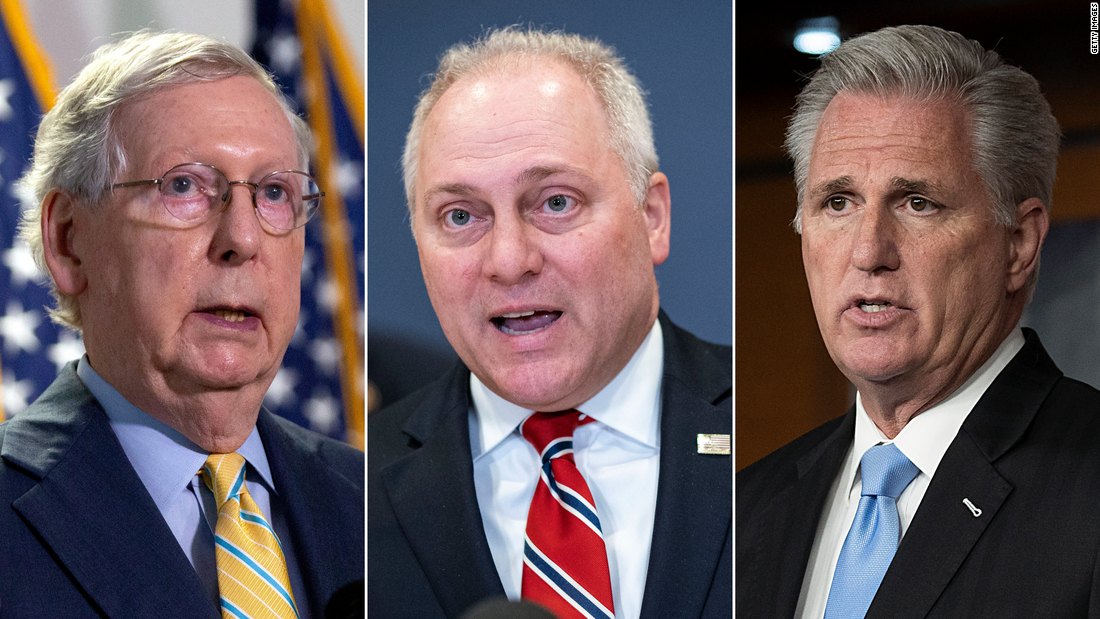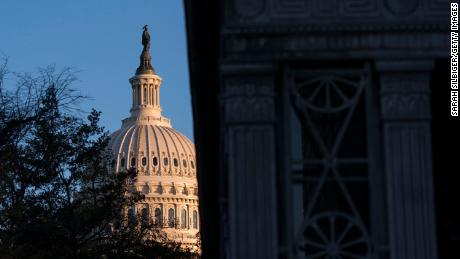Analysis: Republicans risk backlash as they unite against Biden’s Covid relief plan
House Minority Leader Kevin McCarthy described the legislation Wednesday as too expensive and riddled with projects that amount to gifts to Democrats’ liberal constituencies. Senate Minority Leader Mitch McConnell has amplified that argument by alleging that the Democrats’ bill contains “hundreds of millions of dollars for pet projects without a shred of relevance to the pandemic or the recovery.”
“I think all Americans agree (with) exactly what Republicans wanted to have happen,” McCarthy said during a GOP news conference Wednesday, where he noted that he hadn’t spoken to any GOP House members who support the bill. “We want to go back to work, back to school, back to health. Unfortunately this bill is too costly, too corrupt, and too liberal.”
“This is the wrong path and this is not what President Biden said he would do at the inaugural,” McCarthy said. “This seems like a payout for those who agree with them politically,” he said of Democrats.
One strategy that McConnell, McCarthy and House GOP Whip Steve Scalise are now deploying is to draw attention to funding projects within the bill that are tied to the districts and states of key Democratic leaders. The House GOP leaders singled out two examples on Wednesday: a $100 million rapid transit project in the Bay Area in the home state of House Speaker Nancy Pelosi and $1.5 million that would be spent on the Seaway International Bridge over the St. Lawrence River between Canada and upstate New York, which is Senate Majority Leader Chuck Schumer’s home state.
“Who said a subway to Silicon Valley has anything to do with Covid?” Scalise said. McCarthy argued that Americans were watching “the swamp come back to Washington” — echoing a favorite phrase of former President Donald Trump. But CNN’s Alex Rogers reports that Democratic aides argue the money is needed for both infrastructure projects because local revenue and money from tolls has decreased during the pandemic.
Schumer warned that Republicans were proceeding at their own political peril, pointing to a letter sent to congressional leaders from more than 150 business leaders, and first obtained by CNN, arguing that Congress should pass Biden’s American Rescue Plan. The letter noted that “more than 10 million fewer Americans are working today than when the pandemic began, small businesses across the country are facing bankruptcy, and schools are struggling to reopen.”
“The Covid pandemic is the worst economic crisis since the Great Depression, the worst public health crisis our nation has faced in 100 years,” Schumer said in a floor speech where he sought to use that letter from business leaders as a cudgel.
“But our Republican colleagues say all these groups demanding the $1.9 trillion American rescue plan — business leaders, government officials from both parties, economists from across the spectrum and seven in 10 Americans — Republicans say all of them are wrong.”
If the GOP still wants to oppose the bill despite that broad support, the Democratic leader said, “My response is: good luck.”
Promising news on Johnson & Johnson vaccine
While the Biden administration may not be making much headway in their quest for bipartisan agreement on Covid relief, they did get some welcome news on Wednesday about the single-dose Johnson & Johnson vaccine, which they hope will expand the number of doses available to Americans at a time when demand still is vastly outstripping supply.
Before he took office, Biden promised that his administration would oversee 100 million shots in arms in his first 100 days — a goal that his aides described as “ambitious.” But the US was already on track to hit that goal by the time Biden took office on January 20, leading to debate over whether his administration was setting the bar too low. When asked Wednesday how the Johnson & Johnson vaccine doses coming on line would affect that goal, White House Covid-19 response coordinator Jeff Zients acknowledged that they are “pacing ahead of that goal” and said the President “pushes us every day” to do more.
“We view the 100 million shots in a 100 days as a floor and we intend to exceed that goal,” Zients said.
The company is prepared to ship nearly 4 million doses of the vaccine immediately, according to testimony from Johnson & Johnson’s vice president of US medical affairs, Dr. Richard Nettles, to the House Energy and Commerce Oversight and Investigations panel Tuesday. Company officials have said they can deliver enough doses through the end of the March to vaccinate 20 million Americans, once the vaccine is authorized for emergency use.
Initially White House officials and advisers expected to receive more doses of the Johnson & Johnson vaccine sooner, but the explanation for the delay has not been clear. The company has said it will fulfill its contractual obligation to deliver 100 million doses by the end of June.
“We will waste no time getting this lifesaving vaccine into the arms of Americans,” Zients said at Wednesday’s virtual Covid response team briefing.
Though Johnson & Johnson was behind on manufacturing when the Biden team arrived at the White House five weeks ago, Zients said they “are in a better place now.” He said the administration has helped the company with equipment and raw materials to increase their capacity to produce the vaccine more quickly.
“It was disappointing when we arrived,” Zients said. “I think the progress is real and we look forward to continuing to work with the company to accelerate their delivery and their capacity.”
White House press secretary Jen Psaki also acknowledged Wednesday that the amount of initial doses that will be available is less than half than what the administration originally expected.
“We were surprised to learn that Johnson & Johnson was behind on their manufacturing,” Psaki said during her press briefing. “As you noted, it was kind of reported earlier to be about 10 million and now it’s more like 3 to 4 million doses that they would be ready to ship next week if they are moved through the FDA process, which is not yet concluded.”
While the Biden administration does not have full control over the schedule of vaccine manufacturers or what changes Congress may make to their Covid-19 relief bill, they are still taking some steps unilaterally to try to ramp up the nation’s Covid-19 response.
“Not all Americans are wearing masks regularly. Not all Americans have access. And not all masks are equal,” Zients said. “With this action, we are helping to level the playing field, giving vulnerable populations quality well-fitting masks.”
It was a gesture that Biden administration officials said demonstrated their commitment to equity and a focus on the most vulnerable populations, but the simplicity of the move also highlighted the limits of the remaining actions that Biden may be able to take on his own without assistance from Congress.
![]()




